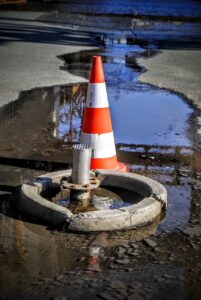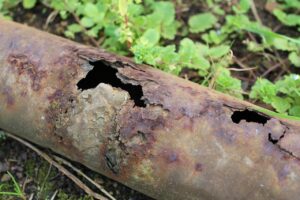When a water pipe bursts through corrosion, old age, excess pressure or the accidental misuse of machinery, the results can be devastating and very expensive. It’s not the cost of replacing the plumbing that makes these sorts of dramas so expensive, but the damage that flooding can do to people’s property and possessions and the potential legal expenses if there is a dispute about liability.
While the potential causes of burst water pipes are varied, the one major cause that most people are aware of is freezing water trapped in pipes. With winter rapidly on its way it’s a good idea to spend some time going over the matter of liability and what can be done if a water pipe has burst and caused damage. Burst water pipes can lead to a major dispute between you and your neighbor or the condo association that is responsible for common property in the block you live in or a municipal or private water provider.
Here are some different scenarios that may help you understand your legal status if a water pipe bursts.
Home owner of detached home

Owner of a rental property
If you own a house or apartment and have rented it out to a tenant, then normally you are responsible for the maintenance of the water pipes that are supplied to that property. A burst water pipe that causes damage to your tenants’ property or others affected by the leaking or flooding water could mean that these affected people could claim compensation from you. Regular maintenance of your rental and adequate insurance can help to avoid negative consequences of a burst water pipe.
The only major exception to your liability as a landlord might be if you have evidence that something the tenants (or owners of an adjoining apartment if that was the source of the leak) had done to make it more likely that the pipes burst. Negligence on part of the tenants (or others) may mean that they could be sued for damage done from the leaking water.
Owner of a condominium
Like any homeowner, you as the owner of the condo are responsible for any water pipe burst that happens in your building. If the water pipe burst causes damage to nearby or adjoining condos then you may be held liable for any damage done to their property.
Condos are also likely to have a network of connecting pipes that lead from the water main source and to and often through the other condos in the block. Your condo association is typically responsible for upkeep and repairs to these common pipes. This means that the association is liable for any damage to individual condo owners’ property from a burst water pipe.
Disputes between neighbors due to a water pipe burst
If your house adjoins another house or houses, or you own a condo, water pipe bursts can lead to messy disputes over who is responsible for the burst pipe and who may be liable for paying compensation. Water pipe bursts can unfortunately occur when owners of the property where the leak occurs are not there to sort the matter out, so it helps if you know how and where to turn the affected water supply off, i.e. where the neighbor’s or condo block’s shutoff valves are located so you can at least minimize the flow of leaking water.
After the immediate threat of damage is attended to, you should gather evidence of the cause of the burst pipe and how it has affected your property financially. If you believe that your neighbor’s negligence was liable for the damage resulting from a water pipe burst, then it is best to talk to them directly about the incident and negotiate compensation before taking further legal action. If you are experiencing resistance to the idea of compensation (e.g. if your neighbor doesn’t have adequate insurance to cover this sort of damage) then you should talk to an attorney about your legal options. Much depends on the total cost to you of the damage done and your chances of a successful claim made through the court. Your attorney can provide advice after assessing the evidence you may have about the burst pipe damage and its cause. Smaller amounts of damages can be pursued through the small claims court.
How to avoid water pipe bursts

Make sure your home insurance policy covers you for pipe bursts
In addition to doing whatever you can to minimize actual water pipe bursts in your own home, make sure that your home insurance police covers you for burst pipe damage to your own property. If you have neighbors who potentially could be affected by a water pipe burst it is also prudent to take out liability insurance to cover you if your neighbors sue you for damage done to their property.
For more information, visit our website or contact us for a free initial legal consultation today
